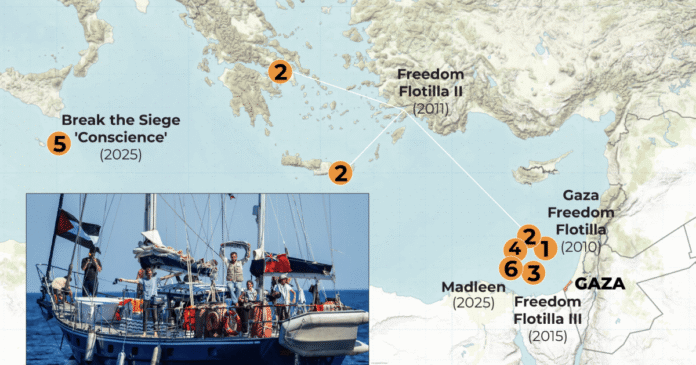The Madleen, launched by the Freedom Flotilla Coalition, is one of several Gaza-bound vessels intercepted by Israel since the Gaza blockade began in 2007.
Early on Monday morning, the Madleen ship, launched by the Freedom Flotilla Coalition (FFC), was intercepted by the Israeli military about 185 km (100 nautical miles) from Gaza, in international waters.
Among the 12 detained crew members are climate advocate Greta Thunberg, Member of the European Parliament Rima Hassan, media journalist Omar Faiad, and other activists.
Israeli media reported that the Madleen and its crew were being taken to the port city of Ashdod, about 30km (19 miles) north of Gaza, where National Security Minister Itamar Ben-Gvir has instructed prison authorities to hold the activists in solitary confinement, isolated from one another and the outside world.
The ship, which departed from Sicily on June 1, was carrying humanitarian aid for starving Palestinians who have been under a strict Israeli blockade since March 2. The blockade was only partially eased last month amid growing international pressure.
Several Freedom Flotilla vessels have attempted to break the blockade of Gaza.
In 2008, two boats from the Free Gaza Movement successfully reached Gaza, marking the first break of Israel’s naval blockade. The movement, founded in 2006 by activists during Israel’s war on Lebanon, went on to launch 31 boats between 2008 and 2016, five of which reached Gaza despite heavy Israeli restrictions.
In 2010, Israeli commandos raided the Mavi Marmara in international waters. The assault killed 10 activists and injured dozens, leading to global outrage. The ship was carrying humanitarian aid and more than 600 passengers.
The Mavi Marmara was owned and run by the Humanitarian Relief Foundation, or IHH, a Turkish NGO. The incident severely strained Israel-Turkiye relations and drew widespread condemnation for violating international law.
In 2013, Israel apologised for “operational mistakes” in the raid. A compensation deal is still being negotiated between the two countries. Israeli soldiers and officials who took part in the attack are being tried in absentia in Turkiye for war crimes.
Freedom Flotilla II was launched in 2011 as a follow-up to the 2010 mission. Organised by a coalition of international activists and NGOs, it aimed to break Israel’s blockade on Gaza and deliver humanitarian aid. The flotilla involved more than 300 participants from around the world and was set to sail on 10 vessels.
Flotillas trying to break Israel’s siege of Gaza
However, intense diplomatic pressure from Israel, coupled with reported sabotage of ships and restrictions by host countries like Greece, prevented most boats from departing.
Only the Dignite-Al Karama came close to reaching Gaza. The 17-passenger French vessel initially declared an Egyptian port as its destination upon leaving Greek waters, but activists later announced they were heading for Gaza. Israeli naval commandos intercepted the boat and towed it to Ashdod. The activists were detained for questioning and later deported.
The Just Future for Palestine Flotilla – also known as the 2018 Gaza Freedom Flotilla – was part of a continued effort by the FFC to challenge Israel’s naval blockade of Gaza. The campaign included two main vessels, Al Awda (The Return) and Freedom, along with two support yachts, Mairead and Falestine.
On July 29 and August 3, 2018, both Al Awda and Freedom were intercepted and seized by the Israeli navy in international waters. All on board were arrested, with some reporting being Tasered, assaulted, or beaten by Israeli forces.
Most participants were held in detention before being deported to their respective countries.
While preparing to sail to Gaza on May 2, the Conscience was struck twice by armed drones, just 14 nautical miles (25km) off the coast of Malta. The attack triggered a fire and caused a significant breach in the hull, forcing the 30 Turkish and Azeri activists on board into a desperate effort to bail out water and keep the ship afloat.
Four people sustained minor injuries in the assault, including burns and lacerations.
According to the latest Integrated Food Security Phase Classification (IPC) report, one in five Palestinians in Gaza is facing starvation because of Israel’s three-month-long total blockade of the Strip, eased partially last month, allowing some food aid.
Some 1.95 million people, or 93 percent of the enclave’s population, are facing acute food shortages.
The IPC says Israel’s continued blockade “would likely result in further mass displacement within and across governorates”, as items essential for people’s survival will be depleted.

